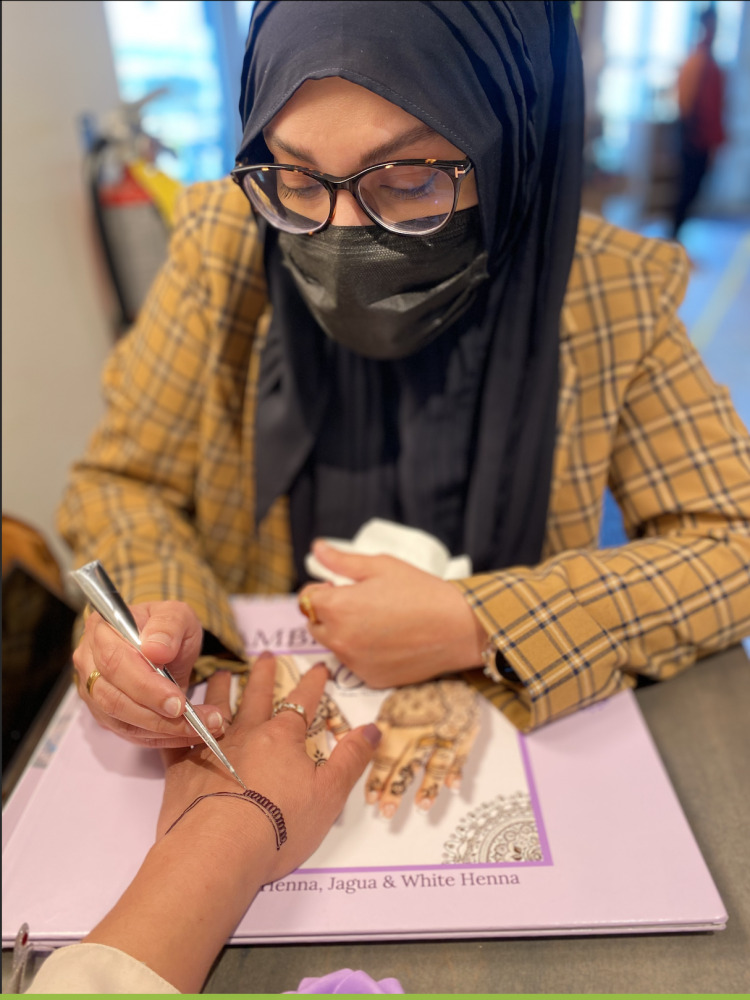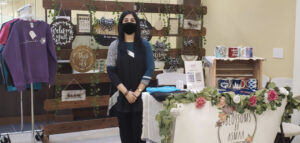Describe your business
My business is all about organic henna, organic Jagua, white henna, and henna crafts. You can find two types of henna in the market – chemical and organic. While I was in Pakistan, someone gave me a henna cone, which I used on my daughter’s hand. The color was too dark and appeared too quickly. However, when it started fading, it burnt my daughter’s skin, etching the entire design permanently, and it was a horrific experience. Once I was here in the US, I had all the time to research to find chemical henna alternatives. After researching the issue by observing various henna artists, I learned about organic and chemical henna and where I could get it since I wanted to be very sure that here in the US, I could get hold of organic henna. I discovered that henna is a plant from India, and the leaves are dried and ground into powder to create different qualities of henna powder. After immense research and trials, I landed with a sustainable supplier that supplies from the hub of Rajasthan, India. I have a passion for delicate and intricate pin work and realized that I need a specific quality of henna for my work since unfiltered henna cannot bring about intricate designs. This led me on a journey to learn about organic henna, its types, and its sifted qualities.
Regarding Jagua, I have been learning about different henna skills. Some henna artists use black henna, and I researched more about it to find that in the market, there is either the chemical black henna or the one made from an Amazonian fruit juice mixed with xanthan gum to make jagua. They use this on the body, and it stains the skin a very deep blue that almost looks like black. Its similarity to permanent tattoos got me interested in experimenting with this too, and I loved the results.
I also do white henna, in which I prefer to use glitter and jewels to make it more elaborate and glammy. Organic henna and Jagua stain last for 8-10 days, and for those people who do not want a stain, white henna is their go-to since it is just an adhesive that stays on your body as an adornment (glitter and jewels) for 2 to 3 days. It’s important for me to connect with diverse communities and cultures, not just Muslims and Indians. By offering a variety of options, I’m finding success in doing so.
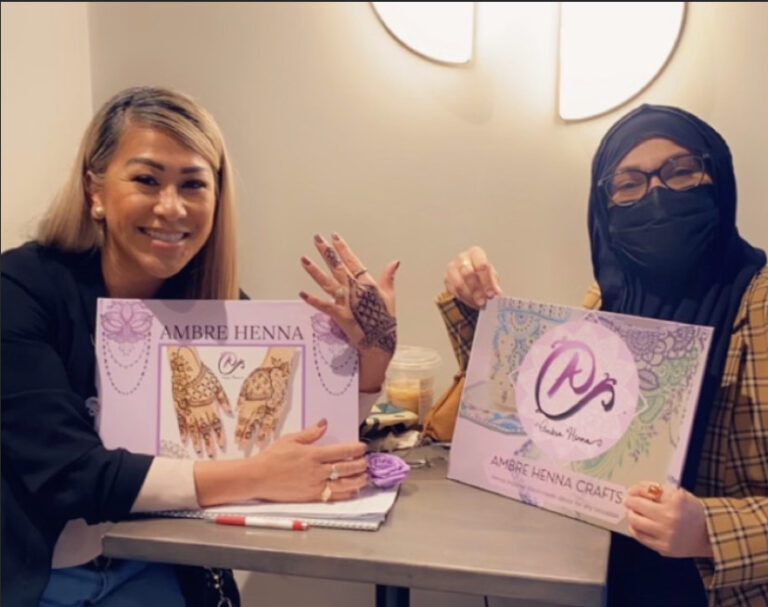
Where are you originally from?
I am originally from Pakistan
How did you get started?
This is my third year doing this, and I started during the pandemic lockdown out of sheer boredom with no intention of turning it into a business. I had just moved from Pakistan at the end of January that year when the lockdown began. The transition was challenging, especially for a psychotherapist like me, who was forced to sit at home with nothing to do. I started exploring things I enjoy and schooling on YouTube. I came across some henna artists on social media during that time, and I was mesmerized by their beautiful work. I started following a couple of them to learn more about their craft.

What has surprised you most when owning a business?
When I first started, I thought it would be easy, and my focus was only on my local community. I wasn’t sure about my niche and style, and I initially believed that traditional henna was the only way to go. It was only later on that I realized my work was not traditional, and that’s what made it unique.
The most challenging aspect for me was the technical side of the business, as I don’t have a degree in business, and I lean more toward creativity than logic. Managing my social media presence and understanding how to market my work effectively proved to be difficult. Additionally, people often have a preconceived notion of what henna should look like, and my unique style is sometimes not immediately comprehended.
I’m also aware that I’m not the only henna artist in the community, and some people are just doing it for fun, which can drive down the market value of the service. However, I take my work seriously and put in a lot of effort and time, and I hope that people will recognize my value.
Why are you different from other artists?
I stand out from other henna artists for a few reasons. Firstly, my niche is intricate and detailed designs, which are very different from traditional henna styles. My approach to henna is unique, and my style is unconventional. Additionally, I have the desire to reach out to diverse communities beyond my own in Mountain House, and my work reflects that. I am naturally driven to make a difference, and I know that the quality of my work deserves to be appreciated by a wider audience. As a result, I want to take my henna to more people and showcase it in a way that highlights its uniqueness.
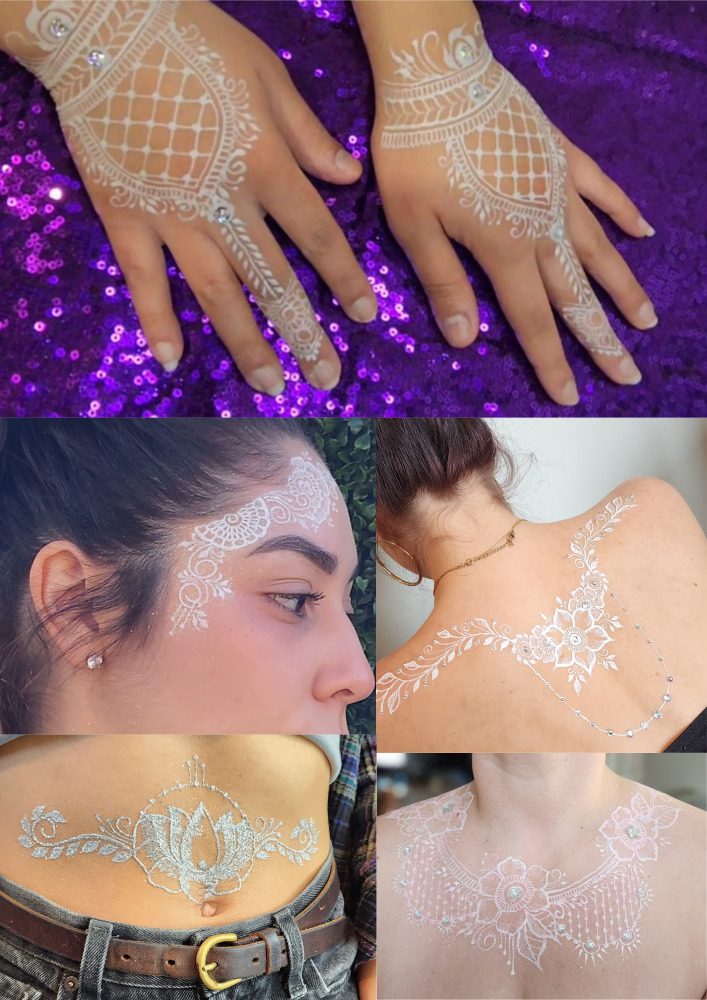
How long do designs take you?
For me, there are two parts to drawing henna designs. When I look at someone’s hand, that’s where my creative process starts. I never repeat my designs because I believe every person’s hand is unique, and my connection inspires me with that person. Incorporating my design elements while being guided by my connection with the individual, allows for a more personal and emotional experience. I take great pride in not repeating my designs, and I feel that every piece I create is a unique masterpiece for the person it’s designed for.
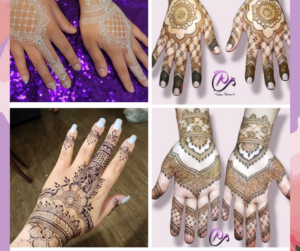
What are your goals over the next year?
This year, I am focusing on putting myself out there more. I have already participated in two bridal expos, which I found out about through social media. Since I do many forms of henna, I wanted to showcase my unique style to a more diverse community. I got a booth and everything I needed to make a great impression. The brides who came were really interested, and I’m hoping to get a lot of bookings from them. I want to move beyond my local community and participate in more events and spring fairs. I have already approached a few and am currently in the process of booking more. By the end of April, I will be at the Tracy Farmers Market with my own booth, where I hope to connect with even more people.
How long have you lived in the neighborhood?
When I moved from Pakistan to the US, I was living in Hansen village. Then I moved to College Park. At that time, my son was already going to Mountain House High School, and I wanted him to finish high school before considering moving. Initially, I thought I wouldn’t stay in Mountain House for too long. Once my son graduated from high school, I thought about moving to a cheaper place, but my business started to look promising. I began selling my henna cones in the community and doing henna, and I didn’t want to start from scratch if I moved. Due to my work, I have been to many other villages and communities, but I find Mountain House very peaceful and beautiful. To me, it has value because it’s where I started my identity as Ambre Henna. I don’t think I would want to leave this place, but I’m uncertain about what the future holds for me. I’m going to trust the process of my journey.
What do you love most about the neighborhood?
I have noticed that there is a lot of exposure to different events and getting to know different people in Mountain House. There is so much diversity and a lot of things happening. There are many platforms for me to connect with people, learn about them, and educate myself about what the world is like. I love it.
What do you want to see improve the most in this neighborhood?
The first thing that I noticed was that there was a lot of construction. I do understand the community is expanding though, but it would be great to have that done with.
Why do you think it's important for people to shop local?
It’s absolutely important to shop locally because it supports the dreams and goals of people, which keeps them motivated. I can relate to this because I sell my henna at the farmers market, and when people purchase from me, it supports and endorses my vision. It helps me grow and achieve my goals in a whole new way, which is amazing. Supporting local businesses is the biggest form of support that they need to thrive.
What is the best way for customers to contact you?
The best way is through my phone call or message me. My social media has all the links for people to message me.
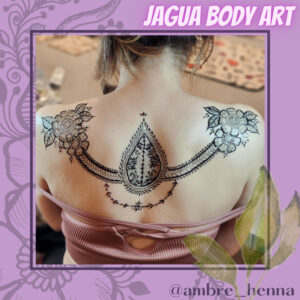
If a young person asked you for advice on how to live their life, what would you tell them?
My advice to all the young people out there is to never change themselves for any requirement that doesn’t feel true to them. This advice covers every aspect of life. I understand that there are practical and logical moments in everyone’s life, but there’s no need to try and fit in. Even after 3 years in this business, I still face challenges to show who I am, but I won’t compromise on the quality of my work just to get more business. It might be okay for them, but it won’t be okay for me. No young person should try to fit in just to be there. A time will come for them to make a difference. Not all flowers bloom at the same time and in the same way.
Note: This article is about Ambre Henna. Please visit their profile page to find more information and review the business.

